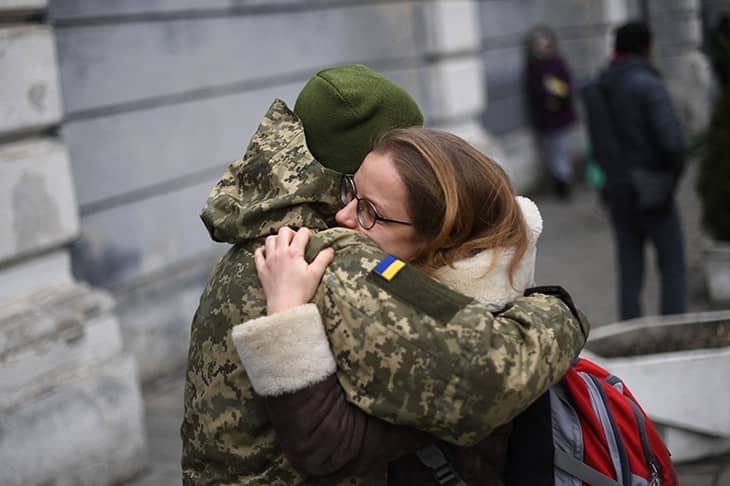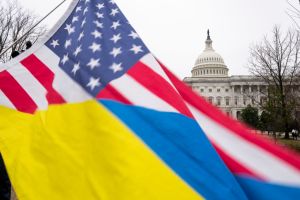Lviv, Ukraine
On the Ukrainian side of the Polish border, near a place called Shehyni where the refugee crisis is brewing, an old black man approaches us. “Am I in Moldova?” he asks gently in French, pointing to the fence. “No,” I tell him. “That’s Poland.” Moldova is 250 miles away. The man shrugs and returns to the endless line of North African migrants. Several young men tell us that they have been there for four days waiting to cross. The Ukrainian guards hold baseball bats. British newspapers have reported “shocking racism” at the border, and of course it is easier to get into Poland if you have a European or British passport and white skin. Yet we witness no ill-behavior. It’s just a very cruel situation.
I’m with my colleague Paul Wood, the veteran war reporter, and Adam Holloway, an ex-army captain and a Conservative Member of Parliament. Adam is in trouble because the British broadcaster ITV — his old employer — has done a story saying Downing Street has “criticized him” for “traveling to Ukraine against government advice.” “It’s complete bollocks,” says Adam. We stay in Lviv, Ukraine’s most western (and nationalist) major city. The citizens are highly anxious, though not as hysterical as many Brits and Americans on Twitter. Lvivians are eager to convey the sense of a great war effort to visiting journalists and it’s hard not to be won over. Old men stop and say “British? Yeass!” and give a thumbs-up. When we say “If you win the war” they interrupt: “When, not if.” They call Putin “Hitler” and “Bin Laden — a terrorist.” They insist that every Ukrainian will fight to the death. And they tend to well up as they say so. It’s inspiring. It’s also fanatical.
Lvivians are also paranoid — understandably — about Russian “saboteurs” infiltrating their city and sowing disinformation. They are reluctant to give names and worried about what we might be recording. In a school sports ground, we see a pair of young girls scrubbing off graffiti which they believe might be enemy markings. “It is strange because it disappears and keeps coming back,” says one. Another local tells us proudly that they have developed codewords to catch out these saboteurs in their midst. They say, for instance, that Russians have no idea how to say “Palianytsia” — a type of bread. “They would say Palinysta or something,” scoffs one. Worryingly, I can’t hear the difference.
Even hipsters are getting in on the act. The Pravda Brewery, which in normal times doubles up as a concert venue, has stopped making beer and is manufacturing Molotov cocktails. The label on the bottle says: “Putin — khuylo!” (Putin is a dickhead). Taras Maselko, the PR guy with a cool haircut, is happy to share the recipe: “3 cups polystyrene, 2 cups grated soap, 500 milliliters gas, 100 milliliters oil, 1 jumbo tampon fuse.” Do they work, we ask. “They did in 2014,” says Taras.
We sit down to lunch with Ihor Smeshko, a retired general and founder of the Strength and Honor party. Over borsch he gives us a detailed lecture about Ukraine’s origins and Russia’s; an antidote, he says, to “this Putin and his barbaric understanding of history.” He cites Herodotus, Marx, Churchill and Sting (“I hope the Russians love their children, too”). He urges us to ask the British government for more air-defense systems and Javelin anti-tank kit. When asked about Russia’s goals, he says: “This is a question not for a general but for an astrologer.” He also says Ukraine will never be defeated and promises that, if the Russians do occupy his country, “they will never be safe in any place.”
The international support for Volodymyr Zelensky is another source of pride. A different senior official says the “real clown” today is not Zelensky, the ex-comedian, but Petro Poroshenko, the businessman turned president, who Zelensky replaced in 2019. Poroshenko has had himself filmed in military fatigues, sporting a Kalashnikov, swearing to defend the homeland. “We don’t believe him,” says our official. Poroshenko looked especially silly when one of the troops standing behind him made the clip viral because the magazine in his rifle slipped out while Petro made his cris de guerre.
Who needs real war when we have culture war? I follow some pro-Russian voices on social media — English-speaking alt-right kids sharing war porn. They like to suggest that the Ukrainians are “larping” about their military campaign — i.e. hamming it up for a western audience. That’s not how I see it. In the St Peter and Paul Church, in the center of Lviv, we see a Ukrainian boy in military fatigues marrying his sweetheart before he goes to fight. The priest puts crowns on their heads and trots them about the altar as the pious ladies at the back of the church sob and cross themselves over and over. That’s not “larping.” It’s heroic. It’s terrible, too.
This article was originally published in The Spectator’s UK magazine. Subscribe to the World edition here.


















